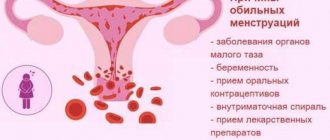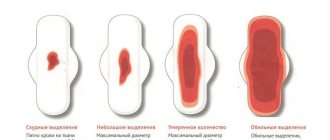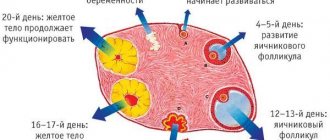Oral contraceptives (OC) are a popular and effective way to protect against unwanted pregnancy. With correctly selected oral contraceptives, as well as following the instructions for use, side effects from taking hormonal contraceptives are minimal.
With the help of OK you can not only protect yourself, but also treat some gynecological diseases. The main thing is not only to correctly prescribe hormones, but also to finish taking them correctly. When will your period come after you stop taking hormonal contraceptives, and how long will it take for your body to recover? These are questions that interest every woman who has taken OCs. Restoring menstruation after stopping OC is an individual process and depends on various factors.
Restoring a cycle after canceling OK
Oral contraceptives (OC) are a popular and effective way to protect against unwanted pregnancy.
With correctly selected oral contraceptives, as well as following the instructions for use, side effects from taking hormonal contraceptives are minimal. With the help of OK you can not only protect yourself, but also treat some gynecological diseases. The main thing is not only to correctly prescribe hormones, but also to finish taking them correctly. When will your period come after you stop taking hormonal contraceptives, and how long will it take for your body to recover? These are questions that interest every woman who has taken OCs. Restoring menstruation after stopping OC is an individual process and depends on various factors.
What to do if there is no menstruation after stopping OK
The absence of menstruation against the background of refusal to continue taking hormones is a reason for an emergency consultation with a gynecologist. First of all, it is necessary to exclude the possibility of pregnancy.
If pregnancy does not occur, the doctor advises to determine the cause:
- sign up for an ultrasound scan;
- check hormone levels;
- get tested for infections.
The doctor selects treatment tactics individually depending on the reasons that caused the problems. To induce menstruation, the doctor may prescribe progesterone; upon its withdrawal, bleeding should begin.
How to cancel OK
In order not to cause hormonal imbalance in the body, you need to stop taking oral contraceptives correctly. There are two ways to complete OK:
1. Cancel OK after finishing taking the tablets from the last package.
2. Discontinuation of the drug before finishing the package.
The best option, of course, is the first way to stop using oral contraception, then in the next cycle your ovaries will begin to try to work on their own. But sometimes it is necessary to stop taking the OC before the package of pills runs out; this is, in principle, an acceptable option, but the body can react to a sharp drop in hormone levels in different ways.
Light, bloody or brown discharge may begin a few days after you take the last tablet and last 1-2 weeks. This is the so-called “withdrawal syndrome”. If heavy discharge occurs, accompanied by severe pain and weakness, you will need to consult a gynecologist.
When after canceling OK the cycle will be restored
The action of hormonal contraceptives is based on the entry into the body of synthetic sex hormones from the outside, as a result of which their production by the ovaries and other organs is inhibited. Recovery of the body after discontinuation of oral contraceptives depends on the age of the woman taking the hormones, her medical history and the duration of taking the drug.
Usually the menstrual cycle normalizes within a couple of months, maximum six months. Long-term restoration of menstruation after taking OCs occurs mainly in those who have been continuously taking birth control pills for a long time, preventing the body from working independently. Especially such situations often happen to very young girls and vice versa to those over 30.
On average, after 3-6 months of taking OCs, the likelihood of pregnancy does not decrease, but if you take birth control for 3-5 years, the production of hormones may disappear, and it will take a long time and considerable finances to restore reproductive function. Therefore, a competent doctor should recommend that his patients take a three-month break from taking oral contraceptives every year.
True, many women ignore this recommendation because of the inconvenience and the need to protect themselves during withdrawal. After 30-35 years of age, recovery of ovarian function after taking oral contraceptives may take more than a year due to a natural reduction in the number of eggs.
The process of normalizing hormonal levels is also influenced by the presence or absence of any ovarian dysfunction or cycle disorders in the patient in the past. If before taking OK the cycle was irregular, then you should not expect it to improve. Most likely, your period will come again with a delay.
By the way, doctors often prescribe a short course of contraceptives to so-called stimulate one’s own ovulation. After 2-3 months of taking OK and abrupt withdrawal of hormones, several follicles mature in the ovary at once, as a result of which the chance of conceiving a child increases. For diagnosis and if any problems with the body are detected, we recommend collaborating with the Doctor medical prevention center https://doctoryar.ru/
How to restore the cycle after canceling OK
If after stopping the pills for 6 months the cycle has not been restored, then the patient requires treatment. Abnormalities are indicated not only by the absence of menstruation, the appearance of acyclic bleeding, but also by spotting after menstruation after discontinuation of OCs.
Treatment must be prescribed based on the results of a comprehensive examination. If the cause of the disorders is infectious diseases, then appropriate therapy should be undertaken. When follicular or luteal cysts appear, a wait-and-see approach is used.
For patients whose examination results reveal a hormonal imbalance, an individual treatment regimen is selected depending on the detected disorders.
No period after cancellation OK
The absence of menstruation after stopping taking OCs leaves women confused. Let's look at the reasons why there may be no menstruation after stopping OK :
During OC withdrawal syndrome in healthy women, the chances of conceiving sharply increase, and then pregnancy becomes the cause of delayed menstruation after discontinuation of Yarina, Logest, Regulon and other popular COCs. After all, after stopping the pills, a kind of restart of the woman’s reproductive system occurs, which allows her to become pregnant in the first cycle.
Pregnancy can also occur while taking OCs, since although oral contraceptives are a reliable method of contraception, they sometimes fail if there is a missed pill, intestinal upset, vomiting, or taking medications that slow down the absorption of the drug. Therefore, the likelihood of pregnancy while taking OCs is not uncommon.
If you abruptly stop taking OCs, there may be a slight disruption in the cycle and the appearance of spotting, which a woman may not mistake for menstruation. Thus, when calculating the cycle, it turns out that its duration increases to almost 50 days. The correct decision would be to consider the first day of spotting as the first day of your new cycle.
Well, as mentioned above, if before taking OCs a woman often had delayed menstruation, most likely the situation will resume with the abolition of contraceptives.
Amenorrhea is the absence of menstruation and is one of the rare but still occurring side effects from taking birth control pills. The reason for the cessation of menstruation after taking OK is a disruption of the hypothalamic-pituitary system, a failure in the production of hormones by the body.
The composition of some oral contraceptives is quite capable of causing similar harm to the body, especially for young girls and women over 35 years old, so you need to select OCs correctly and from a good specialist. If you miss your period after stopping hormonal pills, you should consult a gynecologist or endocrinologist to adjust your hormonal levels and resume menstruation.
Why no periods after stopping birth control pills?
If you decide to stop taking the pills, it may take some time for your cycle to return to normal. This period is individual for each woman. Some return to their normal menstrual cycle in a matter of days, while others take several months for their periods to regulate. In addition, each body reacts differently to changes associated with internal and external factors. Hormone levels fluctuate for many reasons. The absence of menstruation after discontinuation of OCs can be caused by the presence of at least one of the following negative factors:
- Stress increases the level of cortisol, which is also called the “stress hormone.” It affects the hypothalamus, a gland that controls many hormonal functions in the body. As a result, hormonal imbalance may occur. Stress also creates a vicious circle: a woman worries about a missed period, the level of hormones in her body fluctuates, which further reduces the likelihood of getting her period. That's why many doctors recommend taking a pregnancy test in such a situation - urine or blood - to restore peace of mind. Any situation that causes stress can trigger a cycle failure. Final exams, problems at work, illness of a loved one, moving - can cause a disorder in the monthly cycle.
- Long-term use of hormonal contraception. One of the effects of long-term use of hormonal birth control is the thinning of the lining of the uterus, the endometrium. This may eventually lead to no periods for some period.
- Sexual infections. The hormonal method protects a woman from unwanted pregnancy, but is not able to protect her from sexually transmitted infections. Ovarian dysfunction can develop even with a minor inflammatory process. This may affect your menstrual cycle when the drug is stopped.
- Diets. Excessive calorie restriction can lead to hormonal imbalance and negatively impact your menstrual cycle because the body will not receive the nutrients it needs to produce hormones properly.
- Dramatic weight loss. Did you know that cholesterol is needed to produce sex hormones? And this is so. An abnormally low percentage of body fat can wreak havoc on your hormones. Women who are overweight or underweight may experience a variety of hormonal problems, including missed periods.
- Excessive physical activity. Even in women who do not use OCs, excessive exercise can cause delayed or absent menstruation. Intense sports often disrupt hormonal levels and the menstrual cycle. Professional female athletes tend to suffer from amenorrhea, but even amateur athletes can experience this effect.
All organisms are different, and the specific effect after stopping contraception may depend on the symptoms that were observed in the woman before starting to take the pills. But some changes are general:
- More heavy and painful menstruation. If you had pain and heavy bleeding before you started using birth control, your problems are likely to return. Antispasmodics (No-shpa, Spazmalgon) or non-steroidal anti-inflammatory drugs (Ibuprofen) will help cope with pain and improve well-being. If this has not been observed before, you should wait 1-2 cycles, allowing the discharge to normalize after hormonal fluctuations due to discontinuation of the OC. Heavy periods that bother a woman for a longer period of time require additional examination by a gynecologist.
- PMS symptoms. The pill, especially some formulas, helps balance out hormonal chaos that can cause depression, anxiety and irritability. Without their action, symptoms may return.
- Cramps in the lower abdomen in the middle of the cycle. Most hormonal birth control methods work by preventing ovulation. Therefore, as your body returns to its natural functions, you may feel slight cramping in your lower abdomen as your ovary releases an egg. At the same time, periods may become more abundant than when using OK.
- Acne and unwanted hair. The pills can correct the hormonal imbalance that causes your skin to break out and hair to grow in unwanted places. But this is a temporary solution: as soon as you stop taking the OC, the hormones can go out of whack again, which will bring back these problems.
- Increased sexual desire. A small percentage of women find that the pill reduces their libido. After stopping contraceptives, they note an increase in interest in sexual activity.
- Reduced frequency of migraines. If the pills are causing you headaches, you will find relief when you stop taking them.
How do oral contraceptives work on your cycle?
Contraceptive drugs are artificial analogues of progesterone and estrogen - female sex hormones. These drugs, taken orally, are called combined oral contraceptives, abbreviated as COCs or OCs.
The purpose of these drugs is to prevent the egg from maturing and fertilization. OCs make it impossible for sperm to penetrate the uterus and attach the fertilized egg to its wall. Synthetic hormones block the production of their own, thereby making pregnancy impossible. A replacement for menstruation while taking the course is menstrual-like bleeding.
During the period of using contraceptive pills, artificial rest is created for the ovaries. Their activity decreases, and the state of the endometrium in the uterus also changes - it becomes unable to accept a fertilized egg and allow it to take hold.
How birth control pills affect your periods
Under the influence of oral contraceptives, ovulation is suppressed in the female body. Contraceptives block the production of gonadotropic hormones. Under their influence, the follicles stop growing and the eggs stop developing. At the same time, the mucus in the cervical canal thickens. Sperm cannot pass through the cervix into the uterus.
Contraceptives contain synthetic substitutes for sex hormones. Tablets are produced on the basis of different active ingredients. They also differ in the amount of synthetic hormones included in their composition. Contraceptives are:
- microdosed;
- low-dose;
- highly dosed.
The doctor should select the drug, focusing on the principle of action of the medications, the woman’s health condition and the indications for which hormones are prescribed.
What happens in the body after stopping OK
Correct withdrawal is the end of taking the drug after you have taken all the tablets from the pack, that is, after completing the full cycle. The return of the body to the natural cycle is accompanied by:
- changes in the chemical composition of the environment in the vagina;
- decreased viscosity of cervical fluid;
- return to the original state of the endometrium;
- restoration of the secretory stage of the monthly cycle - the phase that begins after ovulation and ends with the arrival of menstruation.
Until the final return to the natural menstrual cycle, instability is observed. Moreover, the delay may be short-lived, and menstruation may become shorter or longer.
Delay after discontinuation of contraceptives
The absence of regular periods after stopping taking OCs is quite an expected phenomenon. The only question is how long it lasts. Normally, the delay should not exceed 3 months. However, even this period of cycle instability may be associated with secondary factors.
Possible reasons for the delay after discontinuation of COCs:
- Pregnancy. It needs to be excluded or confirmed first, since there are factors that reduce the effectiveness of contraceptives. These include drinking alcohol, vomiting, diarrhea, extreme stress, long flights, and missing a pill.
- Young and premenopausal age. In the first case, cycle instability and delay are caused by immaturity of the sexual sphere, and in the second case, by age-related changes in the body.
- Inflammatory diseases of the ovaries, uterus, appendages - salpingoophoritis, cervicitis, adnexitis, myometritis and others.
- Violation of the withdrawal rules - unauthorized cessation of use of the drug before the packaging runs out.
A delay may occur if the woman resorted to using emergency contraception. Such products contain a high dose of hormones, which are a real stress for the ovaries. Their use, especially uncontrolled, can provoke a serious disruption in the menstrual cycle.
When will ovulation resume?
The duration of cycle normalization is determined by the following factors:
- the age and health status of the woman, in particular, the absence or presence of gynecological problems;
- a type of oral contraceptive;
- duration of drug use.
If a woman is young, the body rebuilds itself faster. As you age, it takes longer to adapt to hormonal changes. Slowly after discontinuation of OCs, the cycle is restored in women after 40–45 years.
If you follow all the rules for discontinuing OCs, bleeding begins 3-4 days after the last tablet. This is not true menstruation, but still a replacement. It is also called withdrawal bleeding. After this, the period for complete restoration of the natural cycle, during which the ovaries wake up, takes from 2 to 12 weeks.
A longer delay is observed with inflammatory and other pathologies of the pelvic organs and with general weakening of the body. In such cases, the cycle after stopping taking the pills can return to normal for about six months, on average within 12–16 weeks.
What to do if there is no period after stopping birth control
A delay after discontinuation of the drug may be associated with pregnancy if there were omissions while taking it and unprotected sexual intercourse took place. In this case, the first thing you need to do is buy and conduct a test. Then be sure to make an appointment with a gynecologist who will confirm or deny pregnancy. The test may also be false positive.
If the OC was taken without disturbances, then the delay is associated with the restoration of the body. If there are no health problems, then the cycle should return to normal within the next month, in a maximum of 8–12 weeks.
Why no periods after birth control pills
If after stopping hormonal pills there are no periods for several months, then you cannot do without a visit to the gynecologist. One possible reason is pregnancy. Some patients develop amenorrhea after withdrawal. The likelihood of this pathology occurring is higher in girls who took hormones during puberty.
Lack of menstruation after stopping COCs can be caused by:
- diseases that are transmitted through unprotected sex;
- hormonal imbalance;
- ovarian pathologies;
- disruption of the adrenal glands and thyroid gland;
- the appearance of malignant neoplasms;
- problems with the formation of the endometrium.
It is possible to establish the cause of the disorders and decide on the tactics of further therapy after a comprehensive examination.
Cancellation Policy OK
A woman’s decision to suddenly stop taking a contraceptive or discontinue the drug without consulting a gynecologist is fraught with negative consequences:
- uterine bleeding;
- menstrual irregularities;
- the onset of an unwanted pregnancy.
To avoid these troubles, it is important to follow the rules for stopping oral contraceptives:
- You should not stop taking any contraceptives suddenly. The cancellation is being carried out gradually.
- You should stop taking the drug only after the end of the next cycle.
- It is forbidden to make an independent transition from one OK to another, since the body’s reaction can be unpredictable.
- Cancellation must be agreed with the doctor who prescribed the drug, after preliminary tests and examination.
Before switching to another OC, you need to finish all the tablets from the package, strictly following the dosage regimen, and wait until your period begins. You can start taking a new medication only a week after the end of menstruation.
After discontinuation of oral contraceptives, hormonal levels may return to normal from several weeks to several months, depending on the drug, the duration of its use, and the woman’s health condition. If the delay is accompanied by vaginal discharge, abdominal pain, or there is a possibility of pregnancy, you should not ask a friend for advice. The women's forum won't help either. The first thing you need to do is visit a gynecologist without delay.
source
When should my period start after taking birth control pills?
If you do not have periods after taking birth control, this is a reason to consult a doctor. Oral contraceptives impose their own hormonal levels, which may differ from the usual. At risk are women with functional disorders of the hypothalamic-pituitary system. Their body may require both an adjustment in the dose of hormones and subsequent assistance in restoring periods after stopping birth control if they do not exist.
Periods while taking birth control pills
When using correctly selected contraceptives, menstruation occurs regularly. In the first 3-6 months of therapy, periodic spotting is allowed. This is how adaptation to the drug occurs.
When taking birth control, your period starts every 28 days. The patient takes hormones for 21 days, and then takes a week break. During this period, menstrual-like bleeding begins. Due to the decrease in hormone levels caused by stopping the drug for a week, the endometrium begins to be rejected.
Patients taking oral contraceptives (OCs) note that their periods are easier. The volume of blood released decreases, the duration of menstruation shortens, and pain disappears.
No periods while taking birth control pills
The absence of menstruation due to the use of drugs is a reason for an unscheduled visit to a gynecologist. If your period does not start within 6 days after stopping birth control, pregnancy must be ruled out. If the test turns out to be positive, then you should not start the next package. It is not necessary to have an abortion because a woman took oral contraceptives during pregnancy. In the first days after fertilization, they do not have a negative effect on the embryo.
In rare cases, your period will stop after you start using birth control. This is an individual reaction of the body to synthetic hormones entering the body from the outside.
My period does not end when I take birth control pills
One of the common side effects that occurs after starting birth control treatment is intermenstrual bleeding. Women may experience spotting during 3-6 months of using oral contraceptives.
How do birth control pills affect the body?
Birth control pills contain ethinyl estradiol and a progestin component. They begin to be taken from the first day of the menstrual cycle and set the rhythm for the entire month. A stable minimum concentration of estrogen is maintained in the blood. The pituitary gland receives a signal that there are enough hormones, so FSH synthesis is blocked. Progestins inhibit the release of luteinizing hormone, so the follicle does not ovulate and it is impossible to become pregnant.
But menstruation comes after the end of the drug package during a seven-day break . They differ in nature, duration and intensity from regular periods. With the use of contraceptives, less blood is lost and the pain that many women experience in the first days disappears. In addition to inhibiting ovulation, contraceptives have the following effects:
- thickening of cervical mucus;
- change in the functional layer of the endometrium;
- reduction of PMS symptoms;
- antiandrogenic effect of some COCs.
Normally, when using contraceptives, there should be no delay in menstruation. If this symptom is observed, you need to change the drug or completely stop using it.
The additional effects of birth control pills are used for medicinal purposes. They are prescribed for severe premenstrual syndrome, in the initial stages of endometriosis, and for mastopathy.
How to properly stop birth control pills
Most medical experts and doctors suggest not stopping birth control mid-cycle. Instead, it is recommended to finish the current packaging and not start a new one. This helps the body more easily return to its normal cycle. Also, if you stop taking birth control pills mid-cycle, you may experience cramping and spotting as early as two days after your last pill. Hormones obtained from the tablets are eliminated within two days. The body then tries to restore the natural menstrual cycle.
The absence of menstruation after stopping the OC should not cause immediate concern in a woman, since it is a variant of the norm. However, in some cases, this may indicate pregnancy, so a home pregnancy test or a blood test for hCG in a clinic is what will help clarify the situation.
You can prevent unwanted conception and normalize your cycle with the help of hormonal drugs. But, having stopped using them, many are faced with the fact that there are no periods after stopping birth control. If such a situation arises, a consultation with a gynecologist and ultrasound is necessary. After all, contraceptive drugs affect the natural hormonal balance, change it, so there is a possibility of complications after their discontinuation.
The effect of birth control pills on the monthly cycle
A properly selected contraceptive in healthy women does not cause menstrual irregularities. The risk of failure increases when using older generation drugs:
They contain ethinyl estradiol and levonorgestrel in high doses. Sometimes a similar effect is observed when using other hormonal drugs: Depo-Provera, Norkolut, Danazol, Zoladex.
The following drugs have less effect on the monthly cycle:
- Silhouette;
- Regulon;
- Novinet;
- Belara;
- Midiana.
Yarina, Janine and Jess have an antiandrogenic effect. Zoely belongs to a new type of monophasic drugs, which contain natural estrogen. It has less impact on the cycle. For premenopausal women, as well as those who do not have periods after taking contraceptives, it is recommended to switch to the three-phase contraceptive Qlaira.
During your appointment
After stopping taking birth control pills, the arrival time of menstruation is relatively stable, bleeding begins 2-3 days after the last dose . During the adaptation period, which lasts up to 3 months, disruptions in the monthly cycle and scanty brown discharge between menstrual bleeding are possible.
Later, your periods should return to normal. If this does not happen, you need to consult a doctor. First, the gynecologist recommends excluding pregnancy. The next stage is replacing the drug. The doctor will select a COC with a minimum dose of progestogen, for example:
If the cycle does not level out within three months, you should stop taking hormonal birth control pills.
Women who do not follow the instructions for the drug and do not take a break for 7 days after the last pill can cause a delay in menstruation and amenorrhea. It must be remembered that this scheme is used only in preparations that contain 21 active tablets and 7 pacifiers.
The continuous regimen is used as a therapeutic regimen in premenopausal women. They are recommended to take contraceptives for 3 months in a row and only after that take a break for 7 days.
After cancellation
After completing a course of taking COCs, it takes several months to restore the cycle; rarely, the suppression of the pituitary gland occurs so severely that regular periods begin to appear only after a year. In most cases, the cycle recovers on its own, but sometimes hormonal treatment is required. The doctor prescribes it after ruling out possible pregnancy. Drugs used:
- dydrogesterone;
- micronized progesterone;
- clomiphene citrate;
- dopamine antagonists.
How long can a missed period last and what needs to be done?
Even if your periods were clockwork before you started using contraception, it may take several months for your period to even out after you stop taking the pill. And if irregular periods were the norm for you in the past, this problem is likely to return. The reliable schedule you enjoyed was only the result of hormone pills. If your periods stop altogether, it may take several months for them to return. Gynecologists recommend allowing the body to recover on its own for 3 months after stopping birth control pills. If your periods are absent or remain irregular after this period, consult your doctor to find out the cause.
Rule out possible pregnancy
Many women think it takes a long time to conceive after they stop taking the pill, but studies show they are about as likely to get pregnant almost immediately as women who used barrier methods (such as condoms). Up to 96% of women taking birth control pills become pregnant within a year. If a delay in menstruation causes concern and suspicion in a woman, it is recommended:
- take a blood test for hCG in the clinic (determines pregnancy already on the 6-8th day after fertilization of the egg),
- take a home pregnancy test (it will help detect pregnancy only at 3-4 weeks).
Reasons and timing of missed periods after taking the pills
With contraceptives, the delay in menstruation can take varying amounts of time. The period is individual and depends on the general condition of the hypothalamic-pituitary system and its reaction to the use of COCs.
In the first months of use
The reason why menstruation does not start for a long time when taking birth control pills is the addiction of the endocrine system. This requires up to 3 full cycles. The unresolved problem suggests another reason - the disappearance of menstruation is associated with the components of contraceptives. This effect is caused by large doses of progestogens and low estrogens. To eliminate the malfunction, you need to use additional ethinyl estradiol throughout the entire monthly cycle or change birth control.
If the problem persists, it is ovarian hyperinhibition syndrome. Its occurrence is often associated with a disturbance in the rhythm of the release of gonadotropic hormones.
With long-term use
Menstruation may also disappear after prolonged use of contraceptives. Women often notice this symptom during a cycle when they forget to take one or more pills. Sometimes such an oversight leads to restoration of fertility and pregnancy. Therefore you need to do a test. The embryo is able to attach ectopically, because in the uterine cavity the endometrium is of insufficient quality. About an ectopic pregnancy they say:
- lower abdominal pain;
- bloody discharge from the genital tract;
- symptoms of internal bleeding.
There may be slight bleeding, which indicates a tubal abortion without rupture . If the pain is accompanied by an increase in temperature, a tummy tug, or symptoms of intoxication, this is a sign of an inflammatory process. Any of these conditions requires emergency medical attention. Treatment of ectopic is performed surgically; inflammation is treated with antibiotics.
After stopping treatment
The reason that there are no periods after birth control pills is often due to incomplete diagnosis and failure to take into account the influence of additional factors when choosing a contraceptive method. It can be:
- unfavorable medical history and premorbid background – late menarche, ovarian dysfunction. COCs are able to even out the cycle and mask disturbances, but after completing the course the problems will worsen.
- infectious diseases in adolescents that can affect the functioning of the brain; frequent acute respiratory viral infections affect the function of the hypothalamus; in adulthood, they become the reason that menstruation does not come on time after birth control.
- simultaneous use of Reserpine, Phenothiazine, drug use leads to inhibition of the pituitary gland, the woman will stop taking COCs, but will not have her period.
- If a woman stops taking birth control pills and her period does not come, it is necessary to exclude hyperprolactinemia. Long-term use of COCs leads to depletion of catecholamines, dopamine and disinhibition of prolactin secretion.
- endocrine pathologies also lead to missed periods when taking birth control pills and after stopping the course. Complications can occur in women with hypothyroidism, autoimmune thyroiditis, adrenal tumors, in which testosterone increases in the blood.
Ovarian hyperinhibition syndrome may be incomplete: the woman stopped taking pills, but with the help of hormonal treatment, the cycle was restored. Complete inhibition is a condition in which the reproductive system does not respond to treatment.
Influence
When taking small doses of hormones, only a partial blocking of the processes occurs, so a situation arises when the follicle has the opportunity to mature. In this case, ovulation occurs at its scheduled time. But pregnancy does not occur, since the fertilized egg is unable to attach to the wall of the uterus.
It turns out that the fertilized egg dies. The death of the egg is caused by the endometrium, which changes under the influence of hormones. The mucous membrane becomes more loose. It turns out that a hormonal abortion occurs.
The second type of drugs has an almost similar effect, but in this case the possibility of egg maturation is blocked. In this case, there is interference with the functioning of the pituitary gland. The natural hormonal background is replaced by an artificially created one, and it is perceived by the body as pregnancy.
Long-term use of contraceptives of this type leads to the fact that the uterine endometrium is greatly loosened, and the secretion produced by the cervix becomes thicker. Corresponding cyclic changes do not occur in the ovary.
It is a well-known fact that oral contraceptives are used in medical practice to treat many gynecological diseases. But their use allows achieving only a temporary effect, since the source of the problem in this case remains.
As a result, treatment leads to the fact that the resource of follicles invariably decreases. Another very unpleasant feature of these drugs, which they try not to remember, is that they all have a high degree of carcinogenicity, since the hormones they contain are synthetic substitutes for natural ones. This significant drawback of oral contraceptives has long been confirmed by long-term studies.
Previously, this type of drug was used by doctors very rarely, only in cases of urgent need, when the question of the patient’s life or death arose. Now hormonal drugs are used quite widely, not always justified, including for oral contraception.
The use of hormones was previously considered justified when they were supposed to replace a missing organ. For example, when removing the ovaries, and then only in young women. The remaining cases do not fall under the vital criteria.
Therefore, when taking oral contraceptives, it is necessary to weigh the possible negative effects and the effect obtained from taking them. A more competent approach would be to, if possible, search for alternative methods of treatment and prevention of unwanted pregnancy.
Doctors' recommendations
Gynecologists recommend not to stop monitoring your periods when using contraceptives. If side effects persist after the adaptation period, you should consult a doctor. A delay after taking birth control is not normal. If this symptom appears, you need to make sure that there is no pregnancy. A negative test will suggest a functional impairment, which should resolve within a month.
Women taking oral contraceptives are registered with a gynecologist and must visit him once a year. During a regular inspection, the following is performed:
- smear from the cervical canal;
- Ultrasound of the mammary glands in patients under 40 years of age;
- mammography in women over 40 years of age;
- Ultrasound of the pelvis;
- coagulogram.
If, after taking birth control, menstruation does not begin within two cycles, the patient is diagnosed with ovarian hyperinhibition syndrome and treated. Induction of the cycle is possible with the help of gestagens. From the 15th day of the cycle, Duphaston or a similar drug is prescribed for 10 days, oil solutions of progesterone are used. Postinor cannot be used for treatment . After completing the course, your period should begin in a few days. If the first time is ineffective, the regimen is repeated, but upon completion of induction, Clomiphene is prescribed. Stimulation of menstruation can also be carried out with dopamine receptor antagonists.











